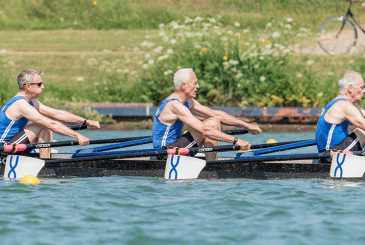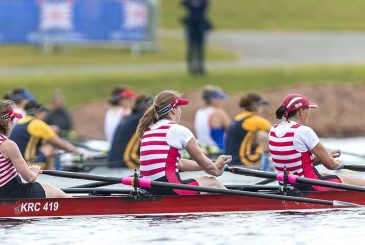Award-winning blogger and journalist Patricia Carswell has given herself three areas to improve on as she seeks to balances the demands of life and rowing. She is pictured above racing at the 2019 World Masters on Lake Velence. Read her latest blog below
It was all going so well. With a new coach adding extra incentive, I’d thrown myself into winter training with gusto. After a frankly pitiful score in an erg test, there was work to be done and I was here for it.
Following my own advice, I found a way to train through the Christmas holidays, indoor rowing and doing weights when I could and arming myself with resistance bands and online HIIT workouts when I couldn’t.
But then – yup, you guessed it – disaster struck. A niggle in my knee turned into a full-blown injury. Rowing was out of the question. And instead of leaping energetically into the new year, I greeted 2022 at a slow hobble.
It’s a familiar pattern – I train, I overtrain, I get injured, rinse and repeat. So as I reluctantly ploughed up and down the local swimming pool this morning, I got thinking – can I find a way to train smarter in 2022?
I suspect most masters rowers grapple with how to get fitter, stronger and faster without pulling a hamstring, tweaking a back or wrenching a shoulder; how to train competitively without overtraining; and how to balance a regime that gives us the edge with all the demands of work and home and family.
I can’t claim to know the answers (if you do, let me know), but here are the three things I’m going to work on:
1 – Ruthless prioritising
I need a more precise idea of my training goals for the year, rather than just a vague idea that it would be great to win something and nice to get fitter. So I’ve figured out exactly what races I really, really want to be fit for and which ones I would be happy to miss. As it happens, the key ones for me are regattas, which gives me a bit of time.
At the same time, I’m avoiding crazy challenges. In the past they’ve been a sure-fire way to get injured – fun though they are – and they won’t help me get race fit. So no random rowing marathons or ill-advised physical challenges. Even if you ask me nicely.
2 – Obeying the stop sign
Nine times out of 10 there are warning signs before an injury. A niggle or a twinge. Fatigue. Feeling sluggish about training. And most of us are guilty of ignoring those signs until we are forced to stop.
So I’ve resolved to start obeying the stop sign. I’ll take those niggles to the physio. I’ll take the damned extra rest day (even if it’s not on the training plan).
Of course this is easier said than done. If I stopped a workout every time I felt a twinge I’d never do anything. But if I can at least replace, “It’ll be fine” with, “I’ll keep an eye on that”, I’ll have a sporting chance of nipping problems in the bud.
3 – Stress control
I’m pretty sure stress is the key to a huge number of physical issues and I’m willing to bet I’m not alone. Scientific studies are full of the corrosive effects of excess cortisol, but life seems to deliver up a constant stream of things to worry about (again, I’m far from alone).
There’s only so much any of us can do to avoid stressful situations, but there’s a lot we can do to address how we handle it, so this is going to be a priority for me this year. I’m not yet sure what this will look like – whether it will be meditation or time out or what – but I’ll keep you posted.
How do you get the balance right? Have you found the answer to the masters’ conundrum?
Let me know your top tips!










